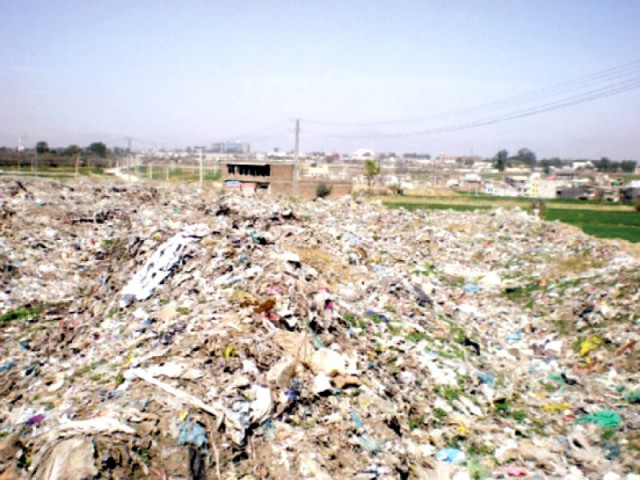Waste management: Project to generate energy from garbage under consideration
The project, if completed, will recycle 800 to 850 tons of solid waste every day.

The Rawalpindi city district government (CDG) is considering collaboration with non-governmental organisations (NGOs) to set up a recycling plant for solid waste management in the garrison city.
The project, if initiated successfully, will recycle 800 to 850 tons of waste produced on a daily basis.
Three union councils - Chaklala, Rehmatabad and Ghariabad - have been selected for a pilot project currently being discussed in association with Akhtar Hameed Khan Memorial Trust and UN-Habitat.
A meeting in this regard was held on Monday, which was attended by the Rawalpindi District Coordination Officer (DCO) Saqib Zafar, representatives of UN-Habitat and Municipal Services Executive District Officer Imtiaz Ahmed Malik.
Malik, while explaining the proposal to The Express Tribune, said the project aims to utilise garbage dumped by nearly 1,000 households on a daily basis to generate renewable energy and ensure cleanliness in the city. The NGO, he added, will not only manage solid waste but will also raise awareness among people.
The organisation requires a 500-square yard plot to separate recyclable and non-recyclable garbage, which will then be used produce energy. The NGO will charge a nominal monthly fee from locals in the area to meet the plant’s expenditure, including employees’ salaries.
A committee headed by the DCO has been established to monitor the project. Other members include EDO Malik, district social welfare officer, representatives of UN-Habitat and traders’ association.
Malik said the CDG had initially suggested establishing the recycling plant at Losar near Soan River, where the entire city’s garbage is dumped, but the NGO suggested initiating the project on a small scale and chose a different site for the project.
Currently around 200,000 tons of solid waste is dumped in the city annually, which is not only expensive but also poses health and environmental hazards for residents.
Published in The Express Tribune, August 7th, 2012.












1724319076-0/Untitled-design-(5)1724319076-0-208x130.webp)






COMMENTS
Comments are moderated and generally will be posted if they are on-topic and not abusive.
For more information, please see our Comments FAQ